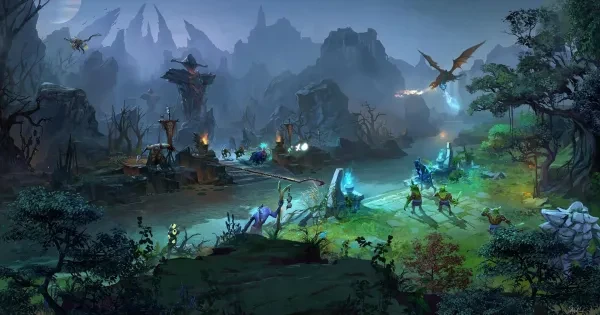Press F to stream: Why video games from Halo to The Last of Us are coming to TV
[ad_1]
Like, I’m guessing, a fair number of you, the first time I experienced Halo I wasn’t even the one behind the controller. Instead, I spent a night sat on my best friend’s bunk bed, watching as he fought an alien cult, alien parasites and an assortment of disturbing yet strangely endearing alien soldiers.
At 10, I’d of course sat through movies, and gorged on books. But I’d never before spent eight to 10 straight hours engaged in one thing, let alone something as surreal, otherworldly and alien as Halo. But as soon as I saw that final cutscene of a planet exploding as we sped away in a spaceship, I was hooked.
Twenty years later, that scene might just be coming back. Paramount+’s Halo series premiered barely a week ago, the end of a nearly decade-long development hell, as studios struggled to bring the story now spanning 16 games and 20 novels to the screen. Still, it’s a blisteringly fast progression for a format that, less than 10 years ago, was known for such forced emotional interactions as Call of Duty‘s “Press F to Pay Respects.”
There, players were told to commemorate the entirety of their relationship with best friend and fallen comrade Pte. Will Irons by attending his funeral, approaching the casket amid a swell of violins and … pressing F.
But for a medium that has been widely derided as less-than or even dangerous, video games making their way to TV represents a double-edged sword.
WATCH | Halo The Series trailer:
And while there’s an interesting answer to why so many adaptations are coming now, the fact that they’re coming at all continues to reinforce an old idea: that video games aren’t true vehicles for storytelling, or an accessible way for “regular people” to engage with the stories they tell — despite dwarfing the revenue of both the movie and music industry combined.
“It’s seen as sort of validation, or kind of a coronation, like: ‘Hey, video games are suddenly worth paying attention to because movie makers and TV makers deigned to pay attention,'” said Ben Lindbergh, a senior editor at pop culture outlet The Ringer.
Lindbergh, who has also tracked the veritable tidal wave of video game shows on the horizon, said while that may be a good thing for the industry, it doesn’t excite him as a gamer. Video games might represent the next frontier for an industry hunting for another Marvel universe to colonize, but it comes at the expense of the games’ ability to capitalize on audiences themselves.
WATCH | Do video games do enough to include everyone? | CBC Kids News:
Because — instead of games maturing into a respected format for storytelling — they’ve simply become fodder for studios, after successfully mimicking what made legacy media, such as television and movies, work. Meanwhile, those studios are ignoring the inherent advantages video games have for telling stories in the first place.
“I just kind of feel like: Well, if I like the game, the game already exists,” Lindbergh said. “I already had that experience.”
Adaptations in the pipeline
And Halo really is far from alone. HBO’s The Last Of Us — widely hailed as one of the best storytelling game series ever made — will premiere as a series fronted by Chernobyl‘s Craig Mazin sometime in 2023. Netflix’s Resident Evil, a live-action reboot of the classic horror series — which was already adapted as a series of movies starting in the early 2000s — is coming out July 14. Fallout and God of War are headed to Amazon Prime, with rumours of Mass Effect in the works from the streamer as well.

Meanwhile, live-action Pokémon (which started as a video game), Assassin’s Creed, Splinter Cell and two Far Cry series — as well as a Tomb Raider anime — are all coming to Netflix.
And dj2 Entertainment — a studio geared specifically toward bringing video games to the small screen — recently shared it’s building shows based off of Disco Elysium, Life Is Strange and It Takes Two.
What’s mind-boggling is that’s not even close to an exhaustive list.
When announcing those last titles, producer Dmitri M. Johnson had a bit to say on why all these adaptations are coming down the pipe.
“The dj2 team has long believed that video games would one day serve as incredible source material for stories told in television and film,” Johnson said, “and that it was only the lack of love and respect for the artform which previously held successful adaptations back.”
But when it comes to adaptations, they haven’t all been failures. Dj2 itself saw somewhat shocking success with 2020’s Sonic the Hedgehog, and the sequel Sonic the Hedgehog 2 has generated positive buzz ahead of its North American release this month. 2019’s Pokémon: Detective Pikachu, 2016’s The Angry Birds Movie, 2010’s Prince of Persia and more had positive box office as well.
Even still, the vast majority of adaptations have not only been box office busts, but everyone spoken to for this article agreed nearly all have been critical disappointments in the main thing they were supposed to achieve: telling a good story.
“There’s not a great history of it,” Susan Arendt, a 15-year video game journalist veteran who now hosts a podcast dedicated to the gaming world, said. “Take Resident Evil, for example; while phenomenally successful — like, they print money — they’re bad. The Resident Evil movies are not good.”
Video game writing about ‘creating a player experience’
Peter Boychuk, a Vancouver-based games writer and adjunct professor of video game writing at UBC, said some difficulty in moving games to other platforms lies in the fact that writing for one is inherently different than writing for the other.
“You’re not really writing a story, even if it’s a very narrative-driven game,” he said of crafting a game narrative. “You’re creating a player experience.”
Games are more about guiding audiences through a “core player fantasy,” Boychuk said, creating branching possibilities for users to interact with directly. It lets them inhabit a character and an experience more fully than movies or TV ever could, and identify with them over much longer arcs that can span hundreds of hours.
And Eric Hayot, a literature professor at Penn State University who writes and teaches about the connection between video games and literature, argued that as game writers intentionally and subconsciously aped the techniques of novels and films in the ’90s, the line between them as art forms blurred — even if critics and audiences refused to recognize it.
“The Last Of Us is a really good example of that,” he said. “But I think there are a number of other games that are trying very hard to represent to us, in some sense, some of the richness and the full range of human emotion.”
The Last of Us is a popular video game-turned-TV series, filming in Edmonton. It will feature Pedro Pascal (The Mandalorian) and Bella Ramsay (Game of Thrones). Explore Edmonton’s Dan St. Pierre reflects on the show’s impact on his city. 1:13
Arendt said that for most of Hollywood and video games’ history, executives didn’t see that evolving complexity as something worthwhile to wrestle into movies. Instead, they simply saw game titles as a cash-grab: big names that provided more in terms of a built-in audiences than they did narrative content.
That’s why studios largely chose games with little-to-no inherent story (like Super Mario Bros., Mortal Kombat and Doom) or virtually replaced any existing story already present in place of an oversimplified reinvention (Tomb Raider or Uncharted).
Those choices also came alongside a cultural disdain for the relatively new medium of video games, which still haven’t fully turned the corner as comic books have begun to. When games company Electronic Arts was founded in the ’80s, they published an advertisement with the somewhat insecure title “Can a Computer Make You Cry?” — a question still seemingly unanswered in gaming research as recently as 2005.
And in 2010, film guru Roger Ebert was still arguing video games could never be art, as any that actually put storytelling first conveniently “ceases to be a game and becomes a representation of a story, a novel, a play, dance, a film.”
Arendt said that doubt around video games’ narrative heft has started to change — which is why studios are now choosing source material with meatier stories “that can translate really easily to TV and movies, if you just get out of the way.”
And while TV gives even more space to adapt these stories than movies did, taking them there still shows an “inherent bias,” to legacy media, said Arendt, when audiences could instead watch play-throughs (videos of others going through games), sit on their best friend’s bunk bed as I did — or, as Arendt said, “just go play the freaking game.”
Game and movie journalist Justin Carter said there’s both good and bad to the adaptation wave. TV adaptations can offer a way around the gatekeeping and controversies that swirl around video game culture and make it especially hostile to LGBTQ+, non-white and non-male players.
But continuing to position TV and movies above games motivates games writers to imitate them, and potentially lose what makes video games unique, and — in some ways — better. At the same time, pushing out too many adaptations too quickly could torpedo the video game revolution before it’s even begun.
“There’s an equal chance for things to go perfectly right and continue this relative upswing that we have,” Carter said. “But also it’s kind of like the house of cards, and it feels like just a few more hits and we could be at Square 1 again.”
[ad_2]
Source link









